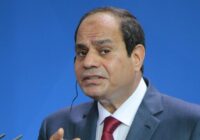Trump’s effort to project American interests in the Middle East has been a disaster — to Russia’s benefit.
Russia’s strategy in the Middle East is infinitely more perceptive and successful than the incoherent American effort. President Vladimir Putin’s recent visit is a good example of the expanding influence of Russia in the region. Egyptian and Russian ministers signed a $21-billion deal to finance and build Egypt’s Dabaa nuclear power plant. Putin and Egypt’s President Abdel Fattah al-Sisi also agreed to work toward rebuilding economic and military relations to the way they were in Soviet times. President Sisi sees the durability of the US alliance as unreliable.
In Syria, Russian support was crucial in the defeat of ISIS and other jihadi rebels and has cemented its influence there for a future generation. Russian/Iranian relations are again blooming in trade, energy and military cooperation. Even in the Sunni Arab oil producing countries of Saudi Arabia, UAE and Qatar, Russia’s spreading influence has been helped by the alignment of interests in curtailing oil supply and maintaining high energy prices.
Contrast this to American policy, which has been compete in the energy markets to depress prices and to remove America as a market for Middle Eastern oil. Moreover, President Donald Trump has gone out of his way to offend Muslim sensibilities throughout the region both by his clumsy travel ban, racially charged rhetoric and the recognition of Jerusalem as the capital of the Jewish state. The only other initiatives Trump has come up with are to encourage Crown Prince Mohammad bin Salman to ally Saudi Arabia with Israel against Iran, fight a proxy war in Yemen and to ditch all economic and political support for the Palestinians.
The one positive achievement from Trump’s inaugural foreign visit was the much touted $100 billion worth of arms sales to Saudi Arabia. Like most of what Trump says and does there is so much less to this than the claim. There is no $100-billion deal. There are letters of interest or intent, but no contracts. In fact, not one single new arms contract has been signed. The US Senate has neither reviewed nor given approval for any new strategic arms contracts with Saudi Arabia and, of course, there is considerable doubt about whether Saudi Arabia could even afford to spend such amounts of money. President Putin has carefully sidestepped the folly of this sort of thinking: He has concentrated on making friends and influencing people, signing real deals and positioning Russia as a dependable partner with no ideological bias.
All this muddled US policy traces back to Trump’s naive mantra of “America First.” In reality this is no more than pandering the prejudices of his base — the white working class — but at the same time pushing through policies to please his wealthy donors. Trump may not know it, but US foreign policy has always been America first. The whole purpose of American projection of its power — military, economic, cultural and diplomatic — has been to shape the world environment to American interests. This never needed to be stated, and American success in doing this is obvious to all.
But the Trump version of “America First,” and how he translated this into Middle Eastern policy, has reversed the process. Trump has allied himself to Sunni governments that are undemocratic and deeply unpopular with their own people, carelessly insulted Arabs and Muslims and stirred up a new confrontation with Iran. He has also thrown his weight behind a right-wing Israeli government that is poised to annex the majority of the West Bank and force the Palestinians to live in a collection of self-governing unconnected “reservations.”
None of this is of any benefit to the US. In fact, it is the reverse and with long lasting negative implications. The State Department and Secretary of State Rex Tillerson’s contribution to Middle Eastern strategy has been almost totally absent or ignored. President Trump has appointed only one ambassador in the whole region — to Israel — which highlights his priorities. This is disrespectful at the very least to the regimes he is trying to be friends with. In short, the whole effort to project American interests in the Middle East has been a disaster, and one Russia has benefited from and will continue to exploit for the reminder of Trump’s presidency.
Putin is delighted: Russian relationships will endure long after the regimes that love Trump so much have disappeared.
The views expressed in this article are the author’s own and do not necessarily reflect Fair Observer’s editorial policy.
Photo Credit: Frederic Legrand – COMEO / Shutterstock.com
Support Fair Observer
We rely on your support for our independence, diversity and quality.
For more than 10 years, Fair Observer has been free, fair and independent. No billionaire owns us, no advertisers control us. We are a reader-supported nonprofit. Unlike many other publications, we keep our content free for readers regardless of where they live or whether they can afford to pay. We have no paywalls and no ads.
In the post-truth era of fake news, echo chambers and filter bubbles, we publish a plurality of perspectives from around the world. Anyone can publish with us, but everyone goes through a rigorous editorial process. So, you get fact-checked, well-reasoned content instead of noise.
We publish 2,500+ voices from 90+ countries. We also conduct education and training programs
on subjects ranging from digital media and journalism to writing and critical thinking. This
doesn’t come cheap. Servers, editors, trainers and web developers cost
money.
Please consider supporting us on a regular basis as a recurring donor or a
sustaining member.
Will you support FO’s journalism?
We rely on your support for our independence, diversity and quality.






